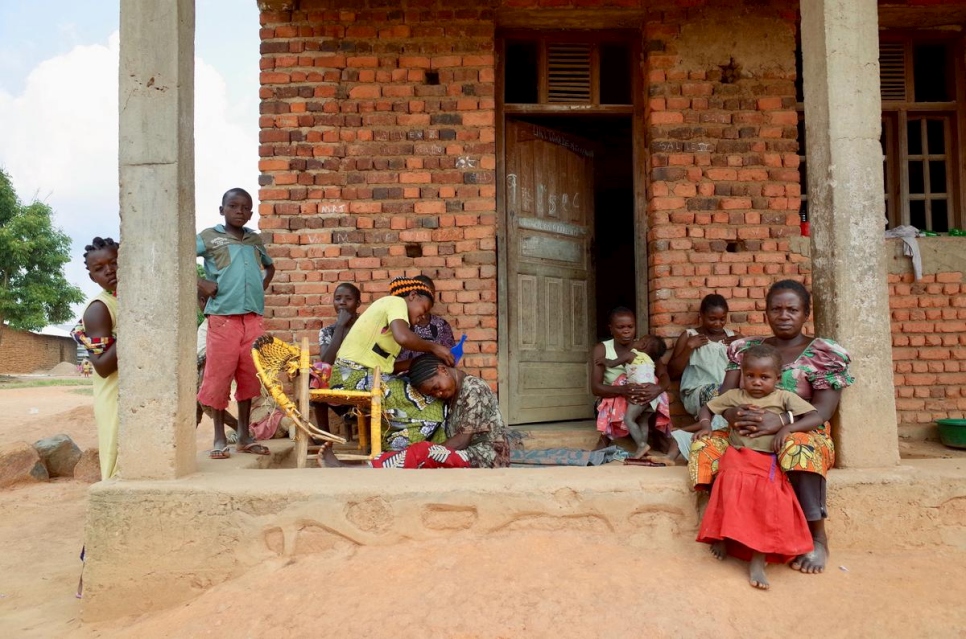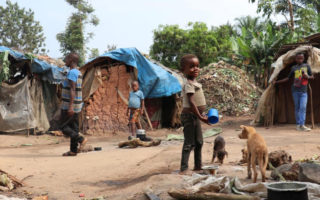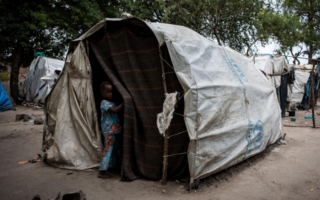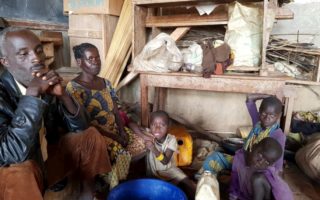
An internally displaced Congolese family shelter in a school in Oicha, North Kivu province, in the Democratic Republic of the Congo, July 2018. © UNHCR/Natalia Micevic
This is a summary of what was said by UNHCR spokesperson Andrej Mahecic – to whom quoted text may be attributed – at today’s press briefing at the Palais des Nations in Geneva.
UNHCR, the UN Refugee Agency, is concerned by the worsening situation in the Democratic Republic of the Congo’s eastern Beni Territory where violence has forced more than a hundred thousand civilians from their homes over the past two months.
Attacks by armed groups since December last year on a number of towns and villages that comprise the Watalinga Chiefdom, near the border with Uganda, have displaced women, men and children to the town of Nobili and surrounding areas.
Many were displaced previously and had only just returned to their villages in November last year, after fleeing violence in April. They remain in dire need of assistance.
Tensions in the region have been rising since the launch of a government-led military operation in December against the Allied Democratic Forces (ADF).
Civilians, including those displaced in November and December, are among those targeted by armed groups, including the ADF. An estimated 252 civilians are reported to have been killed in Beni Territory since December last year, according to local authorities.
Many people told UNHCR staff that they now live in fear, after witnessing killings, sexual violence and abductions at home and during flight.
The majority of those forced to flee in the latest wave of violence are now being sheltered by local host communities in Nobili town who have welcomed displaced families without hesitation but lack resources to even meet their own needs.
Others took refuge in overcrowded schools and churches around Nobili town. UNHCR and partners are providing them with emergency shelter assistance which is also enabling schools to be returned to their normal purpose.
Thousands more are living in dire conditions across a hundred or so informal settlements, sleeping in huts made of branches. They are exposed to the elements and face serious threats to their safety and protection, including from the lack of privacy.
The vast majority of those displaced are women and children who, along with other internally displaced people (IDPs) remain in urgent need of basic assistance and protection. Key needs include food, shelter, water, sanitation and hygiene and access to education.
A large number of displaced children are not attending school. Schools either do not have the capacity to host additional pupils or are closed because they are now sheltering IDPs, placing a huge strain on already inadequate educational infrastructure.
Mambale school in Nobili currently hosts 500 displaced students, bringing the total number of students to 800. The school now runs double shifts with pupils attending either in the morning or the afternoon.
To respond to the needs of those displaced and their local host communities, UNHCR and partners, together with local authorities and humanitarian actors, are now providing aid to those displaced in Nobili.
Last week UNHCR distributed emergency shelter assistance in the form of tarpaulins to help 3,000 displaced families. To help improve the protection and safety of those displaced, UNHCR is also supporting the development of three community-based protection structures. These will help in the identification, prevention and response to human rights violations.
UNHCR is also contributing to an ongoing profiling exercise coordinated by the United Nations Office for the Coordination of Humanitarian Affairs (OCHA) with technical support from UNHCR. The data has already helped to target humanitarian assistance and will continue to improve the quality of multisectoral protection, assistance and services for those in need.
More than five million people remain displaced in the DRC, representing Africa’s largest internal displacement situation. Our staff are currently present in North Kivu, South Kivu, Tanganyika and Ituri Provinces responding to the massive waves of displacement.
UNHCR needs USD 150 million to respond to refugee and IDP needs in DRC this year but has only received four per cent to date.
For more information on this topic, please contact:
- In Kinshasa, Fabien Faivre, faivre@unhcr.org, +243 825 443 419
- In Pretoria, Hélène Caux, caux@unhcr.org, +27 82 376 5190
- In Geneva, Shabia Mantoo, mantoo@unhcr.org, +41 79 337 76 50
Originally published by UNHCR on 11 February 2020





